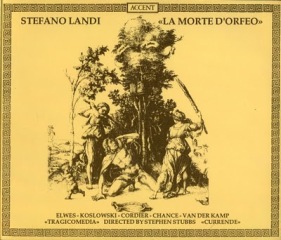Stefano Landi - La Morte d'Orfeo
Stefano Landi - La Morte d'Orfeo

1. Atto I 2. Atto II 3. Atto III 4. Atto IV 5. Atto V Orfeo - John Elwes - tenor Euridice - Nisa – Euretto - Jahanna Koslowsky - soprano Teti, regina del mare - Lincastro - Euretto - Pastore – Ecco - Michael Chance - contratenor Aurora - Calliope, madre d'Orfeo – Pastre - Myra Kroese - contralto Mercurio nel cielo - Fileno, pastor nunzio – Pastore - Wilfrid Jochens - tenor Apolline del cielo – Ireno - Nico Van der Meel - tenor Ebro fiume - Furore – Caronte - Harry Van der Kamp - bass Fato nel cielo - Uno delli Dei - Giove nel cielo - Lieven Deroo – bass Vocal Ensemble Currende Ensemble Tragicomedia Stephen Stubbs – director
The tiny Belgian independent label Accent specializes in period instrument performances from the Low Countries, and in 1987 recorded this Dutch/English production of Stefano Landi's "Tragicomedia pastorale" at the St. Gilles Church in Brugges, Belgium. In order to appreciate the value of this disc, you have to know something of the background: The Orpheus legend was one of the best-loved subjects for early opera at the beginning of the 17th century. The most famous version was written by Alessandro Striggio and set to music by Claudio Monteverdi at Mantua, but there were other versions around at the same time by lesser known composers such as Peri and Caccini. Stefano Landi, who was born in Rome but moved as a young man to Padua, turned to this legendary story in 1619, but instead of re-working the old story about the death of Euridice, he opted to compose an opera on the sequel, the death of Orpheus at the hand of the Maenads, servants of Bacchus, who were incited to murder him by Bacchus himself because he had not invited this god of wine and surfeiting to his birthday party!
In order to turn this story into a five-act opera, the librettist Alessandro Matthei introduces a total of over thirty mythical figures including not only gods and heavenly messengers, shepherds and satyrs, but also winds and a river - these last have quite extensive sung parts! This is very different from Monteverdi's version. As far as the composition itself goes, it consists, like Monteverdi's later operas, almost exclusively of recitative, interrupted occasionally by duets, terzets or choral interludes. The musical background is provided mainly by a continuo force of organ, lirone, harp and lute, occasionally complemented by violins or cornets.
Director Stephen Stubbs, who also plays the chitarrone (a type of guitar), has tried to create a "historical" performance, although in fact it is doubtful whether La Morte d'Orfeo was ever performed during the composer's lifetime. This means that he not only uses historical instruments but also that his singers are, with two exceptions, all male, a total of ten roles being played by the two star countertenors David Cordier and Michael Chance. If you don't like very high male voices (Cordier could be taken for a soprano!), avoid this CD-box like the plague! But if you enjoy historically "authentic" singing, then there is much to enjoy here: Cordier and Chance were, at the time of the recording, coryphaei of countertenor.
Of course, the fact that practically all the singers except John Elwes as Orpheus have to sing up to five parts makes pretty confusing listening, and I found it necessary to refer constantly to the booklet. Elwes himself sings well, but his performance seems to me to be overshadowed by that of the two countertenors and by bass Harry Van der Kamp, whose performance as the River Hebros, as Furore and, in particular, as Charon in the underworld left a lasting impression. The other singers all do well without being particularly outstanding; Johanna Koslowsky has some poignant moments, especially in the last act where she plays the shade of Euridice, who has lost all memory of Orpheus. Of course, this is historical performance practice, so there is practically no vibrato to be heard anywhere. The instruments sound wonderful, and there is some excellent cornet playing by Bruce Dickey and Doron David Sherwin in the first act.
Accent makes no attempt to facilitate access to this more or less unknown work. The booklet contains a helpful, but extremely brief introduction by Professor Silke Leopold, a synopsis of the action that reduces whole acts to two sentences, and the libretto in 17th century Italian only without any attempts at translation. It should perhaps also be added that the times stated for the various tracks are often unreliable, making it impossible for me to give the production anything but an average evaluation. The sound, too, is not anything to write home about - adequate, yes, but the voices are often muffled, and there is too much echoing in the empty church recording venue.
But there is, as far as I know, no rival recording, so if you are interested in early 17th century opera or in the history of the musical development of the Orpheus legend, you should go for this CD-box despite its limitations. --- Leslie Richford (Selsingen, Lower Saxony)
